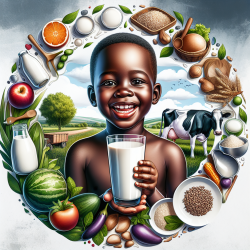Introduction
In the quest for sustainable food systems, the role of dairy in child health and well-being has emerged as a critical area of focus. The research article "Food Systems Transformation for Child Health and Well-Being: The Essential Role of Dairy" highlights the importance of dairy in supporting child health within the context of food system sustainability. This blog aims to guide practitioners in implementing these findings to improve their skills and encourage further research.
The Essential Role of Dairy
Dairy foods, such as milk, cheese, and yogurt, are rich in essential nutrients that are crucial for the growth and development of children. These nutrients include calcium, vitamin D, and high-quality protein, which are vital for skeletal health. The consumption of dairy products is recommended in over 70% of global food-based dietary guidelines (FBDGs), underscoring their importance in child nutrition.
Moreover, dairy foods provide a source of beneficial microbes found in fermented products, which may enhance bone health and overall well-being. For children in low- and middle-income countries (LMICs), dairy consumption has been linked to reduced risk of morbidity and mortality and improved cognitive function.
Implementing Dairy in Sustainable Food Systems
To integrate dairy into sustainable food systems, practitioners should consider the following strategies:
- Promote Balanced Diets: Encourage the inclusion of both plant- and animal-source foods, with an emphasis on nutrient-rich options like dairy.
- Support Local Dairy Production: Engage with local dairy producers to ensure sustainable practices and support community livelihoods.
- Educate on Nutritional Benefits: Provide education on the nutritional benefits of dairy to caregivers, schools, and communities.
- Incorporate Dairy in School Meals: Advocate for the inclusion of dairy in school meal programs to support academic performance and nutrient intake.
Encouraging Further Research
While the benefits of dairy are well-documented, further research is needed to explore its role in sustainable food systems fully. Practitioners are encouraged to engage in research initiatives that focus on:
- Environmental Impact: Investigate the environmental impacts of dairy production and identify strategies for reducing carbon footprints.
- Innovative Practices: Explore innovative dairy farming practices that enhance sustainability and reduce resource use.
- Holistic Approaches: Consider holistic approaches that balance health, economic, social, and environmental factors in food systems.
Conclusion
As we strive towards sustainable food systems, the role of dairy in child health cannot be overlooked. By implementing the outcomes of the research and encouraging further exploration, practitioners can contribute to the transformation of food systems that support child health and well-being. For those interested in delving deeper into this topic, the original research paper can be accessed here: Food Systems Transformation for Child Health and Well-Being: The Essential Role of Dairy.










